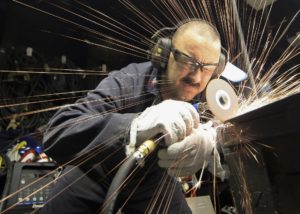Metalworkers have expressed their concern about a lack of health and safety priorities in the workplace.
 More than a third of metalworking professionals do not feel that health and safety is a top priority within their company and over a quarter are worried about their safety at work.
More than a third of metalworking professionals do not feel that health and safety is a top priority within their company and over a quarter are worried about their safety at work.
The concerns have been discovered through research by power tools and accessories manufacturer FEIN.
The research also revealed that although 38% agree they can do their job safely, 45% of the metalworkers agreed that tools with safety features would make them feel more comfortable at work.
Andy Mills, Managing Director of FEIN UK, said: “Health and safety remain critical to the metalworking sector due to the daily use of machinery and equipment that can result in injury when operated improperly and without sufficient training.
“It’s positive to see that on the whole, the industry does not worry about their safety at work; however, there is clearly still more to do in order to make everyone feel comfortable in the workplace.”
Tools with safety features ‘too expensive’
FEIN said as well as employee safety and wellbeing, a lack of health and safety measures can cost a business a lot of money – as workplace related injury or ill health currently costs the UK economy an estimated £18.8 billion a year, according to the latest Health & Safety Executive (HSE) statistics.
Metalworkers in larger companies of 50-99 (50%) and 250-500 (38%) employees are most likely to worry about their safety at work.
Almost half would feel more comfortable if they could use tools with safety features but over a third (39%) agree that the tools with the safety features they want are too expensive.
And while 40% of metalworkers are offered health and safety training by their company – for those in smaller companies with 1-9 employees, it is just 13%.
Andy added: “Our latest research confirms that there is an opportunity to increase contact between tool specialists and users in metalworking, to understand individual needs and discuss the safety features now available on the market.
“At FEIN, our application-based approach means that we are frequently meeting those using the tools on a one-on-one basis, however, industry groups and events are also a really important method to bring conversations around safety requirements into a public forum and leverage the high level of innovation in metalworking today.
“Across the industry, we see metalworkers navigating higher costs and deterred from exploring new safety solutions due to the price tag, however, these decisions should not be made without assessing the overall value.
“We are pleased to lead these conversations and demonstrate with real life examples how investing in safety-led tools can dramatically improve safety standards – increasing confidence, reducing accidents and preventing expenses and downtime accrued in the event of injury.
“We’ve found that the safety features we’ve introduced, including non-removable safeguards, abnormal movement protection and versatile hand-grip, have been received really well by users and recognised by industry bodies such as the BSIF too. We look forward to getting out and meeting more metalworkers throughout the year to discuss how their safety challenges can be overcome.”
Why should you subscribe to the SHP newsletter?
Do you want the very latest health and safety news, product launches, job listings and expert opinions sent straight to your inbox daily?
The SHP newsletter is essential reading – sign up today to get your hands on all this!

 More than a third of metalworking professionals do not feel that health and safety is a top priority within their company and over a quarter are worried about their safety at work.
More than a third of metalworking professionals do not feel that health and safety is a top priority within their company and over a quarter are worried about their safety at work.